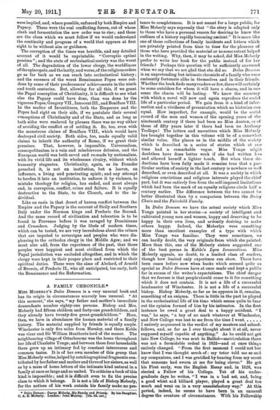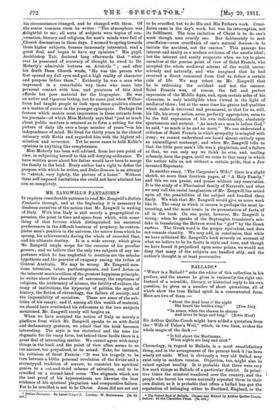A FAMILY CHRONICLE.*
Miss MOBERLY'S Dulce Demurs is a very unusual book and has its origin in circumstances scarcely lees unusual. "At this moment," she says, "my father and mother's immediate descendants number eighty-one persons. Bishop and Mrs. Moberly had fifteen children and forty-one grandchildren, and they already have twenty-five great-grandchildren." Here, then, we have in abundance the human material of a family history. The material supplied by friends is equally ample. Winchester is only five miles from Hursley, and there Keble was vicar and Sir William Heathcote lord of the manor. The neighbouring village of Otterbourne was the home throughout her life of Chavlotte Yonge; and between these four households there grew up an intimacy fed by constant intercourse and common tastes. It is of her own member of this group that Miss Moberly writes,helped by autobiographical fragments con- tributed by her father and mother and threeof her sisters, as well as by a mass of home letters of the intimate kind natural in a family at once so large and so united. To criticize a book of this kind is impossible ; and it is difficult even to fix the precise class to which it belongs. It is not a life of Bishop Moberly, for the notices of his work outside his family make no •pre- Duke Omens : D_oorgn Naar* Xi; Family and Friends. By his Daughter, C. It.•B. Moberly. : Mn Murray. [10s. 6d. net.] twice to completeness. It is not meant for a large public, for Miss Moberly says expressly that " the story is adapted only to those who have a personal reason for desiring to know the outlines of a history rapidly becoming ancient." It is more like one of those collections of family incidents and letters which are privately printed from time to time for the pleasure of those who have provided the material or to someextent helped in the writing. Why, then, it may be asked, did Miss Moberly prefer to write her book for the public instead of for her friends P Perhaps this question will be sufficiently answered when we say that we are glad that she did so. Dales Doinunt is an unpretending but intimate chronicle of a family who were eminently fortunate alike in themselves and in their friends. Whether the book, finds many readers or few, there will certainly be some outsiders for whom it will have a charm, and in one sense the charm will be lasting. We know the' accuracy with which a novel will now and again reproduce the social life of a particular period. We gain from it a kind of infor- mation and a vividness of presentation ,which no historian can equal. How imperfect, for example, would be the social record of the men and women of the opening years of the nineteenth century if there had been no Miss Austen, or of those of fifty years later if there had been no Anthony Trollope I The letters and narratives which Miss Moberly has brought together in this volume will be of a somewhat similar value. She places us in the middle of the society which is described in a series of stories which at one time had a remarkable vogue. Miss Yonge mi g lit doubtless have done better work if she had written kss and allowed herself a lighter tench. But when these de- ductions have been fully made it remains true that a par- ticular section of society in the last-century is nowhere so well described, or even described at all. It was a society in which religious convictions and religious interests played the chief part, but it was entirely free from the self-imposed limitations which had been the mark of an equally religious circle half a. century earlier. The difference between the two cannot be better illustrated than by a comparison between the Daisy Chain and the Fairchild Family.
In Dulce Barnum, we have the actual society which Miss Yonge painted in her stories—a society of intelligent and cultivated young men and women, happy and deserving to be happy in their own lives, and ardently desiring to make others happy. Indeed, the Moberlys were something more than excellent examples of a type with which Miss Yonge was familiar, They were sometimes, we can hardly doubt, the very originals-from which she painted. More than this, one of the Moberly sisters suggested one of the best poems in Keble's Lyra Innoceniium. Miss Moberly appeals, no doubt, to a limited class of readers, though how limited only experience can show. There have been cases before now when books which seemed quite as special as Dulce Domum have at once made and kept a public far in excess of the writer's expectations. The chief danger that we foresee is that peopleshonld come to it for something which it does not contain. It is not a life of a successful headmaster of Winchester. It is not a life of a successful bishop. Bishop Moberly, so far as he appears in it, remains, something of an enigma. There is little in the part he played in the ecclesiastical life of his-time which seems quite to bear out the opinion formed of him by his intimates. In the first instance he owed a great deal to a happy accident. " I was," he says, " a boy of no mark whatever at Winchester, and New College was lost to me from the time I went. . . . . . I entirely acquiesced in the verdict of my masters and school- fellows, and, as far as I ever thought about it at all, never supposed myself capable of anything." As he could not get into New College, he was sent to Balliol—matriculation there was not a formidable ordeal in 1822—and at once things entirely changed. " From the first moment I could not but know that I was thought much of : my tutor told me so and my companions, and I was gratified by-hearing from my scout that someone had sworn at me for being clever." He got his First early, won the English Essay and, in 1826, was elected a Fellow of his College. Yet of his under'. graduate days he writes, "I was in a bad set, and, being a good whist and billiard player, played a great deal too much and went on in a very unsatisfactory way." At this period, indeed, he seems to have been in an unusual degree the creature of circumstances. With his Fellowship , his circumstances changed, and he changed with them. Of the senior common room he writes : " The atmosphere was ,delightful to me ; all sorts of subjects were topics of con- iveraation, literary and religions, for men's minds were full of Church discussions in those days. I seemed to spring towards
1
those higher subjects, became immensely interested, read a great deal, and began to have my opinions." His pupil, Archbishop Tait, declared long afterwards that " what- ever he possessed of accuracy of thought he owed to Dr. Moberly's admirable lectures on Aristotle " ; and after his death Dean Church wrote, "He was the person who first opened my dull eyes and put a high reality of character and purpose before them." Evidently he was a man who impressed in a remarkable way those who came into personal contact with him, and greatness of this kind affords but poor material for the biographer. He was an active and vigorous 4ishop, but he came just when Wilber- force had taught people to look upon these qualities almost as a matter of course in the younger episcopate. Perhaps the feature which makes most impression in these extracts from his journals—of which Miss Moberly says that "just so much about public matters is retained as to form a setting for the picture of daily life over a large number of years "—is his independence of mind. He lived for thirty years in the closest intimacy with Keble and regarded him with the highest ad- miration and reverence. Yet be never came to hold Keble's opinions in anything like completeness.
Miss Moberly has been well advised, from her own point of view, in subjecting herself to this self-denying ordinance. To have written more about her father would have been to merge the family in the head. Every author has a right to define the purpose with which he writes, and Dulce Domain is an attempt to " sketch, very lightly, the picture of a home." Without these self-imposed limitations she could not have attained her aim so completely.









































 Previous page
Previous page